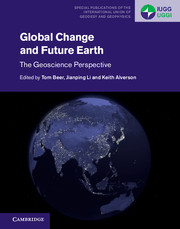Book contents
- Global Change and Future Earth
- Special Publications of the International Union of Geodesy and Geophysics Series
- Global Change and Future Earth: The Geoscience Perspective
- Copyright page
- Contents
- Contributors
- Preface
- Acknowledgments
- Abbreviations
- Part I Future Earth and Planetary Issues
- Part II Future Earth and Geodetic Issues
- Part III Future Earth and the Earth’s Fluid Environment
- Part IV Future Earth and Regions
- Part V Future Earth and Urban Environments
- Part VI Future Earth and Food Security
- 18 Targeting Research towards Achieving Food Security in an Era of Climate Change
- 19 The Contribution of Food Engineering to Achieve Global Food Security
- 20 Supply Chains and Future Earth
- 21 The Impact of Global Climate Change on Nutrition Security: A Multidimensional Challenge
- 22 Marine Systems, Food Security, and Future Earth
- Part VII Future Earth and Risk, Safety and Security
- Part VIII Climate Change and Global Change
- Name Index
- Subject Index
- References
20 - Supply Chains and Future Earth
from Part VI - Future Earth and Food Security
Published online by Cambridge University Press: 22 October 2018
- Global Change and Future Earth
- Special Publications of the International Union of Geodesy and Geophysics Series
- Global Change and Future Earth: The Geoscience Perspective
- Copyright page
- Contents
- Contributors
- Preface
- Acknowledgments
- Abbreviations
- Part I Future Earth and Planetary Issues
- Part II Future Earth and Geodetic Issues
- Part III Future Earth and the Earth’s Fluid Environment
- Part IV Future Earth and Regions
- Part V Future Earth and Urban Environments
- Part VI Future Earth and Food Security
- 18 Targeting Research towards Achieving Food Security in an Era of Climate Change
- 19 The Contribution of Food Engineering to Achieve Global Food Security
- 20 Supply Chains and Future Earth
- 21 The Impact of Global Climate Change on Nutrition Security: A Multidimensional Challenge
- 22 Marine Systems, Food Security, and Future Earth
- Part VII Future Earth and Risk, Safety and Security
- Part VIII Climate Change and Global Change
- Name Index
- Subject Index
- References
Summary
- Type
- Chapter
- Information
- Global Change and Future EarthThe Geoscience Perspective, pp. 268 - 274Publisher: Cambridge University PressPrint publication year: 2018



